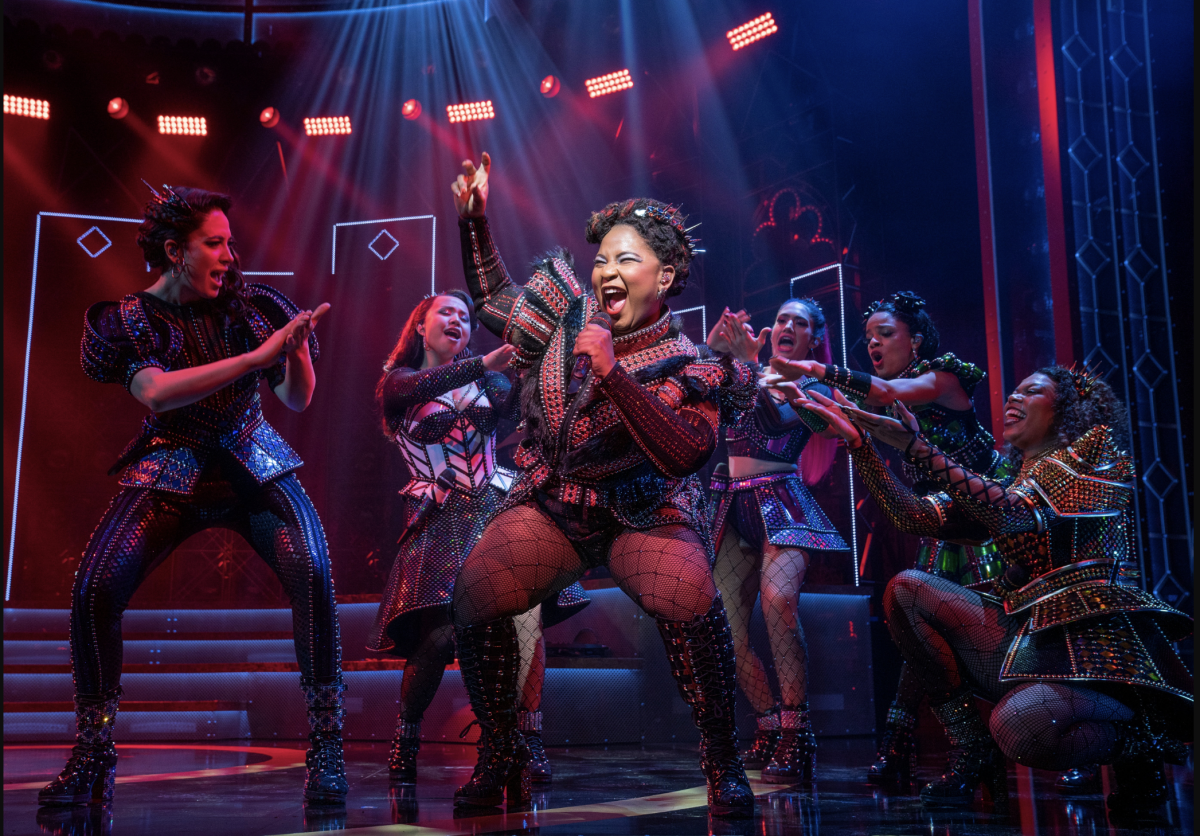
To put together a chart-topping girl group nowadays, you can go through the tedious ordeal of coming up with a fresh hook and holding months of auditions. Or you can find people who already have something in common — a unifying them — but represent a range of takes on it.
Like, say, the six wives of King Henry VIII. They were all married to the same man, but each handled the situation — and suffered the consequences—in distinct ways. (A rhyme memorized by British schoolchildren sums up their fates: “Divorced, beheaded, died, divorced, beheaded, survived.”) Then you just have to bring them back to life, dress them in Tudor/space age fusion and send them onstage through a puff of smoke, a halo of stadium lights, and, as one song lyric puts it, “beats so sick they’ll give you gout,” to rock the world’s historical assumptions.
This is the strategy of Toby Marlow and Lucy Moss, the Cambridge University graduates who wrote the musical “Six” (Moss also directs, with Jamie Armitage), now at the Pantages on its national tour. Like other recent productions that boldly set out to subvert our views on history (“Hamilton,” “Bridgerton,” the latest “1776”), “Six” could be accused of presentism, the habit of judging the past in terms of today’s values, leading to anachronisms that upset historians. It seems unlikely, though, that “Six” would be hurt by this accusation — it might even take it as a compliment.
The musical, which won the 2022 Tony Award for best original score, is unapologetically — intentionally, proudly, joyfully, sometimes jeeringly — revisionist. The Tudor queens onstage look nothing like their historical oil portraits (which are reproduced in chronological order in the program, along with brief biographical details and the modern-day pop divas that inspired each queen’s theatrical persona), and although they share their life experiences, they recount them like modern young women with Tinder accounts who idolize pop divas and have binge-watched more than one season of “RuPaul’s Drag Race.” They’re all proud, fierce, acerbic, athletic (they sing and dance to Carrie-Ann Ingrouille’s relentless choreography without apparent exertion) and at moments terrifying.
Khaila Wilcoxon as Catherine of Aragon in the North American SIX Aragon Tour.
(Joan Marcus)
The show — which is closer to a pop concert than a traditional musical — is structured like a reality competition, the divas explain after their rousing opening group number, “Ex Wives.” Each will perform a solo (with backing from the others) and the audience will choose who should be the group’s lead singer. The twist is the criterion: The winner will be the queen who suffered the most in life.
This showdown sure sounds like a counterintuitive format for a celebratory musical. But the tone it establishes is critical to the show’s success. Terrible things happened to these women, and if we really stopped to think about that we’d probably be too horrified to enjoy the music. Comedy is tragedy plus time, as Mark Twain is credited with saying, but could enough time ever pass to make decapitation funny? Won’t it always be “too soon”? Because the queens themselves are so clearly over what happened to them, and so unsentimental, they give us permission to take it all lightly too. The approach is risky, and there are moments where the show fumbles the delicate balance it has established. But I was impressed overall at how skillfully it dodged its landmines.
Another thing that worried me about the competition setup was how the show could sustain or top its own performative verve. The all-female band, led by keyboardist Valerie Maze, is right onstage, and the energy level is high. Khaila Wilcoxon started the battle off with such a blistering, Beyoncé-inflected take on Catherine of Aragon’s misfortunes, “No Way,” that I actually felt a little sorry for Anne Boleyn — not so much because I knew she was going to get beheaded as because she had to follow that number. Luckily, Storm Lever gave as good as she got with Anne’s solo, “Don’t Lose Ur Head,” and also threw a lot of shade at the wives who complained about lesser misfortunes.
Third wife Jane Seymour (Natalie Paris) brought the room down with an Adele-style ballad, “Heart of Stone,” professing her genuine love for Henry and grief for the son she died before she could meet. I was just beginning to feel sad when the tale of German-born Anne of Cleves (Olivia Donalson) took everything to a zany new level. History tells us that Henry proposed to Anne based on a portrait by the artist Holbein (who gets a German house music vibe in the odd but wonderful group number “Haus of Holbein”) but didn’t like the way she looked in person, so he divorced her, leaving her with a generous settlement and her own palace. Donalson puts the most positive, Rihanna-style spin imaginable on this rebuff, irresistibly exulting in Anne’s wealth and freedom and ultimately acknowledging that she had it so good that she can’t really compete with the other wives in the trauma-off.

Olivia Donalson as Anne of Cleves in the North American SIX Aragon Tour.
(Joan Marcus)
The most dimly recalled of the wives, Katherine Howard (Courtney Mack), is obliged to follow this triumph, which she does with a charming and provocative complaint a la Ariana Grande, “All You Wanna Do,” about the less glamorous consequences of being sexually attractive to men.
That leaves Catherine Parr (Gabriela Carrillo), remembered as the queen who survived, to wrap up the show and put a bow on it in her number, “I Don’t Need Your Love.” The message, perhaps unavoidably, is a bit muddled, but the show is very aware that it’s dancing around important, intractable issues — it voices any objections you might have almost before you’ve thought of them, then dances around a little more. Catherine takes the other queens to task, belatedly and unpersuasively, for comparing their traumas, and for allowing themselves to be defined by them. But the queens argue back that they can’t change history. They can’t go back in time and give themselves happy endings. Or can they? It’s their show, after all. Smiling slyly, they invite the audience to give in to the fantasy.
Maybe some young people in the audience will grow up believing that the six wives of Henry VIII were (rather than the pale, worried ladies in headdresses I’ve always imagined) empowered people in fishnets who could really wail — but plenty of others will be inspired to learn more about their lives and deaths. Does it matter if the revision precedes history? The truth probably lies, unattainably, somewhere in between. We might as well enjoy the music.
“Six”
Los Angeles: Through June 10 at Hollywood Pantages Theatre, 6233 Hollywood Blvd., 8 p.m. Tuesdays-Fridays, 2 and 8 p.m. Saturdays, 1 and 6:30 p.m. Sundays. $39 and up. (800) 982-2787, BroadwayInHollywood.com or Ticketmaster.com. Running time: 80 minutes with no intermission.
Costa Mesa: June 13-25 at Segerstom Center for the Arts, 600 Town Center Drive. 7:30 p.m. Tuesdays-Fridays, 2 and 7:30 p.m. Saturdays, 1 and 6:30 p.m. Sundays. $29 and up. (714) 556-2787, scfta.org.












